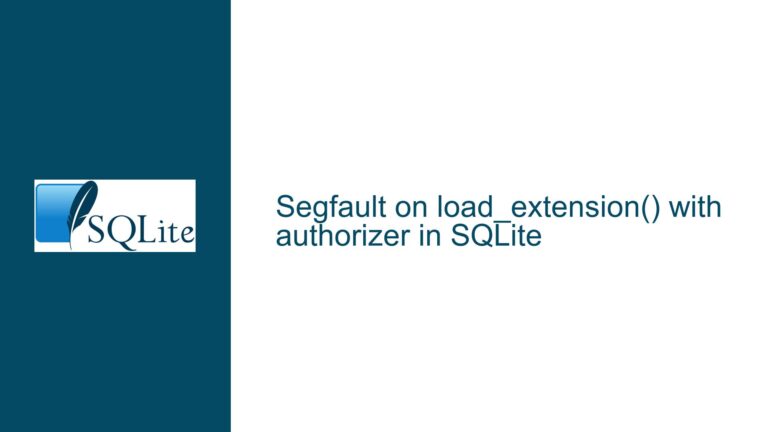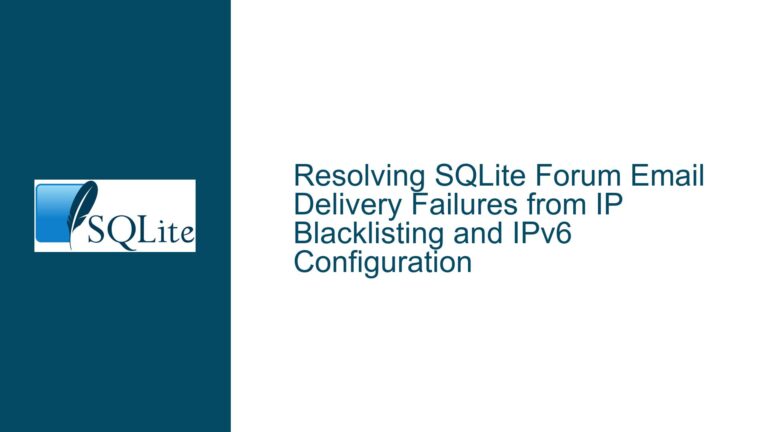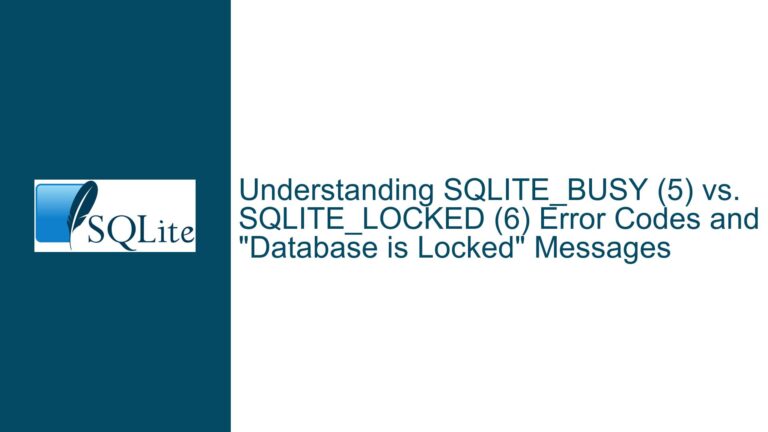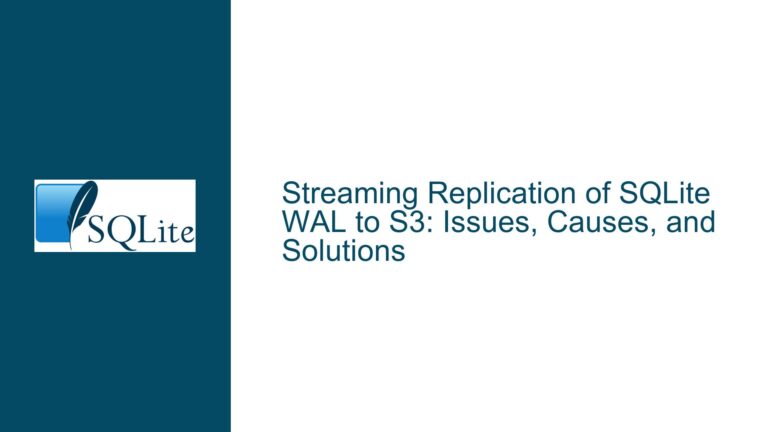Integrating PCRE as a Core SQLite Extension: Initialization Conflicts, Override Behavior, and Shell-Loading Nuances
Core Extension vs. Shell-Loaded Function Initialization Order Conflicts
Issue Overview
The core challenge revolves around integrating PCRE (Perl-Compatible Regular Expressions) as a built-in SQLite extension while avoiding conflicts between core extensions (e.g., ICU or a hypothetical PCRE integration) and shell.c-defined functions (specifically ext/misc/regexp.c). The problem arises from the initialization sequence in SQLite’s architecture:
- Core Extensions (like ICU or a custom PCRE implementation) are typically compiled directly into the SQLite library (
libsqlite3) or loaded viasqlite3_auto_extension(). These initialize before the SQLite shell (sqlite3CLI) opens a database connection. - Shell-Loaded Extensions (e.g.,
ext/misc/regexp.c) are initialized after the database connection is established. The SQLite shell explicitly callssqlite3_regexp_init()post-connection, overriding any prior implementation of theREGEXPoperator.
In SQLite versions <3.36, the REGEXP operator is not natively supported. User-defined functions (UDFs) must implement it. Starting in 3.36+, SQLite introduced a default regexp implementation using the ICU library. If a core extension like PCRE is registered, it should override this default. However, the shell’s post-connection initialization of regexp.c forcibly replaces the core extension’s implementation. This creates inconsistent behavior:
- When SQLite is embedded in an application (using
libsqlite3), the core extension’sREGEXP(e.g., PCRE) works. - When using the SQLite shell, the shell’s
regexp.cimplementation takes precedence, nullifying the core extension.
This discrepancy leads to unpredictable regex behavior across environments and undermines the goal of seamless PCRE integration.
Libpcre Linking Strategies and Version-Specific Override Mechanics
Possible Causes
The conflict stems from three interrelated factors:
1. Initialization Sequence Mismatch
Core extensions rely on SQLite’s auto-extension registration mechanism, which occurs during library initialization (e.g., sqlite3_initialize()). However, the SQLite shell explicitly invokes sqlite3_regexp_init() after opening a database connection. This creates a race condition:
- Core extensions load first, registering their
REGEXPimplementation. - The shell later loads
regexp.c, overwriting the existingREGEXPfunction.
This issue is exacerbated by SQLite’s lack of a built-in mechanism to prevent function re-registration.
2. Static vs. Dynamic Linking of PCRE
If PCRE is compiled into libsqlite3 as a core extension, it becomes part of the library’s global state. However, the SQLite shell is a separate executable that statically links libsqlite3 but may also compile standalone extensions (like regexp.c). This dual linkage creates two competing REGEXP implementations:
- The core extension (PCRE) is active in
libsqlite3. - The shell extension (default regexp) is active in the CLI.
Without explicit coordination, the shell’s extension will dominate.
3. Version-Specific Regexp Handling
In SQLite 3.36+, the REGEXP operator is natively supported but defaults to ICU. Overriding it requires registering a new implementation before the first REGEXP usage. However, the shell’s regexp.c initializes too late to respect this precedence. Furthermore, the sqlite3_regexp_init() function in regexp.c does not check for an existing REGEXP implementation, blindly overwriting it.
Resolving Initialization Conflicts and Ensuring Consistent Regexp Behavior
Troubleshooting Steps, Solutions & Fixes
Step 1: Modify Shell Initialization to Respect Core Extensions
The SQLite shell (shell.c) must be adjusted to avoid overriding core extensions. This involves:
Check for Existing
REGEXPImplementation: Before callingsqlite3_regexp_init(), query whether theREGEXPfunction is already defined.// In shell.c, before sqlite3_regexp_init() call: int rc = sqlite3_create_function(db, "regexp", 2, SQLITE_UTF8, 0, 0, 0, 0); if (rc == SQLITE_OK) { // regexp is not yet defined; proceed with init sqlite3_regexp_init(db, 0, 0); }This prevents redundant registration.
Conditional Compilation Flags: Introduce a compile-time flag (e.g.,
-DSQLITE_SHELL_SKIP_REGEXP_INIT) to skipsqlite3_regexp_init()when a core extension is active.
Step 2: Refactor Core Extension Initialization
Ensure the core PCRE extension initializes earlier than any shell-loaded code. Two approaches:
Use
SQLITE_EXTRA_INIT: Define a custom initialization function that registers PCRE’sREGEXPand link it viaSQLITE_EXTRA_INIT. This function runs duringsqlite3_initialize(), before any database connections.// pcre_init.c #ifdef SQLITE_HAVE_PCRE int sqlite3_pcre_init(sqlite3 *db, char **pzErrMsg, const sqlite3_api_routines *pApi) { // Register PCRE regexp... } #endif // Compile with -DSQLITE_EXTRA_INIT=sqlite3_pcre_initLeverage
sqlite3_auto_extension(): Register the PCRE extension as an auto-loaded extension. This requires modifying the SQLite amalgamation build:// Add to sqlite3.c amalgamation: #ifdef SQLITE_HAVE_PCRE extern int sqlite3_pcre_init(sqlite3*, char**, const sqlite3_api_routines*); sqlite3_auto_extension((void(*)(void))sqlite3_pcre_init); #endif
Step 3: Version-Specific Handling for Regexp Overrides
For SQLite 3.36+, explicitly override the default ICU regexp by:
Using
sqlite3_db_config(): After opening a database connection, invoke:sqlite3_db_config(db, SQLITE_DBCONFIG_ENABLE_REGEXP, 1, (void*)pcre_regexp_impl);This replaces the default regexp handler with PCRE.
Patch
regexp.cfor Graceful Coexistence: Modifyext/misc/regexp.cto check for an existingREGEXPimplementation before overriding:// In sqlite3_regexp_init(): if (sqlite3_find_function(db, "regexp", 2, SQLITE_UTF8, 0) != 0) { // Another regexp is already registered; abort. return SQLITE_OK; }
Step 4: Build System Integration
Ensure the build system links PCRE correctly and conditionally includes/excludes competing regexp implementations:
- Compile-Time Flags: Use
-DSQLITE_HAVE_PCREto enable PCRE core extension and-DSQLITE_SHELL_SKIP_REGEXP_INITto disable shell’s regexp. - Linker Flags: Include
-lpcrewhen buildinglibsqlite3.
Step 5: Testing and Validation
- Environment Consistency Check:
# In shell, verify regexp implementation: SELECT 'abc' REGEXP '^a'; -- Should use PCRE if integrated - Version-Specific Tests:
- For SQLite <3.36, ensure
REGEXPoperator is available only via PCRE. - For ≥3.36, confirm PCRE overrides the default ICU regexp.
- For SQLite <3.36, ensure
Final Solution: Unified Initialization Workflow
A holistic fix involves:
- Patching the SQLite shell to skip
regexp.cinitialization if a core extension exists. - Compiling PCRE as a core extension via
SQLITE_EXTRA_INIT. - Updating
regexp.cto coexist with other implementations.
This ensures consistent REGEXP behavior across embedded and CLI environments.
By addressing initialization order, version-specific behaviors, and build system coordination, developers can integrate PCRE as a core extension without conflicts. The key is ensuring the shell respects pre-registered extensions and that core extensions assert precedence during SQLite’s global initialization phase.






